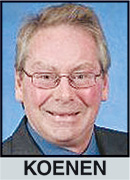 By GLENN KOENEN
By GLENN KOENEN
On National Margarita Day, the Trivia Night hosts in a small southeast Missouri town sold margaritas for $3 a cup.
While waiting in line, the guy behind me asked where I was from. This was not random conversation. At the time my table had a four-question lead over the rest of the pack, led by his table. (We’d eventually win by six questions.)
I explained that my wife and I were playing with friends: two teachers from the local high school, two local sheriff’s deputies and a member of the local Chamber of Commerce.
That wasn’t enough of a right answer. The guy obviously thought he was on the smartest team in town. Alas, the town was too small for that to make a difference.
NOT REALITY
Moving about I’ve heard time and again about how Missourah’s small towns make this state great.
Too bad that’s not reality.
Missouri is an urbanized state, with the economy dependent on two large and one medium-size metro areas to pay for state government. Remember:
- The top 12 counties (including St. Louis City) have a total of 3,774,157 residents while the dozen smallest counties share just 58,104.
- The middle of the pack among Missouri counties, by population, is Pike County with 18,504 people.
Reality hasn’t stopped the Republican majority from stealing as much political power from the urban areas as possible.
Based on population, metro St. Louis (six counties and the city) ought to control three of Missouri’s eight Congressional seats, with greater Kansas City getting two and the Springfield region one. That would leave two seats for the remaining 80 or so rural counties – one north and one south of U. S. Highway 50.
Instead, St. Louis dominates just two districts and the district for KC’s urban core snakes east into Saline County – population 22,895.
Worse, to me, friends in Jefferson County find themselves cleaved into parts of three Congressional Districts – Two, Three and Eight!
RURAL GUY FOR URBAN AREA
Take a look at the Third Congressional District, currently represented by Republican Blaine Luetkemeyer, a man who I once heard call into a radio show from his tractor.
While his district is mainly farmland, the bulk of his voters were stolen from metro St. Louis. In 2018 a total of 324,608 votes were cast in Missouri’s Third: 106,883 came from St. Charles County, 47,132 from Jefferson County, 42,412 from Franklin County and 13,637 from Warren County. In all, those metro St. Louis counties provided 210,000+ votes, almost 65 percent of the total.
Yet, Luetkemeyer is unapologetically a rural Missourah guy. Metro St. Louis is just a place to collect tax money to give to farmers.
Why is this important now?
‘DIRTY’ MISSOURI COMING?
CLEAN Missouri gives a non-partisan state demographer the lead (but not the only say) in drawing the state Senate and House districts.
While CLEAN left the Congressional lines under the control of state lawmakers, efforts this session in Jefferson City seem sure to put a “revised” plan – they say “CLEANER,” I say “DIRTY Missouri” – on the statewide ballot this year. If Republicans have their way, drawing state district lines will be even more obtuse and political than it is now. And, expect that same level of partisanship to overwhelm the drawing of Congressional districts.
In other words, metro St. Louis could find itself dominating just one Congressional District and getting chopped into parts of four others. Imagine Ladue and Clayton sharing a member of Congress with Cape Girardeau!
REPUBLICAN GOAL: ERASE BIPARTISAN REPRESENTATION
Changing CLEAN unleashes a wave of partisanship designed to eradicate as many Democratic lawmakers as possible at every level of government.
The fact that 62 percent of Missourians voted for CLEAN and even more voted against “right-to-work” means nothing to Republicans. Staying in power by any means necessary means everything.
Yes, the people at that Trivia Night tolerated my company. Yet to them I’m just another city slicker who breezed into town to take their money. I didn’t stay around to explain why they need St. Louis and Democrats.
(Glenn Koenen is the retired executive director, Circle of Concern; member JwJ Workers Rights Board; member, Empower Missouri Board of Directors and chairs their Hunger Taskforce.)

